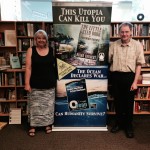The first time I put serious thought into publishing my work was the summer of 1995, at the age of twelve. I’d been writing longer than that, but in 1995 I completed work on my first novel. Naturally, I was very proud of it. I’d given it to my English teacher to peruse, and he told me it was promising (it wasn’t; this was a blatant lie, told in the interests of not discouraging me from continuing my burgeoning hobby, which I suppose makes it okay). My family said it was great, as did some family friends who had taken the time to look it over. All lies, all of them. Either that or these people had seriously poor taste in literature. I’d much rather prefer to believe they were all lying to me.
The internet was a relatively new innovation at this time, one to which I did not have access at home. Our family had recently purchased our first home computer—a 386-something-or-other that ran Windows 3.1, if you dared enter that rabbit hole, but most of the time I stayed in the safe, warm embrace of black-screened DOS and its easy-to-navigate list of ten games I played over and over again. These were simpler times, and the internet hadn’t yet punctured them.
The internet had, however, made its first appearance one street over from mine.
Armed with my rave reviews, and the promise of finding answers to my publishing questions on this new-fangled world wide web, I paid an afternoon visit to a friend’s house. My friend’s mom sat down with me in front of the computer and together we ran a search—on Lycos, I think, or maybe AltaVista?—for how I could publish my first novel. I was no noob; I knew things. For example, I’d written a Star Trek novel, and thus I could limit my inquiries to one publisher in particular—Pocket Books, who had an exclusive deal with Paramount to handle the Star Trek novel line.
I’d been promised answers, and answers I got. And they were very discouraging. I learned that Pocket Books would only accept my novel and give it consideration if I had an agent to represent me. Next, we tried searching for information on how to get an agent, but there were no clear-cut answers to be found. Well, at least some things haven’t changed in the intervening twenty years!
My discouragement struck hard and fast because I had a whole slew of questions about how to make it as a bigtime author, and I intrinsically knew that the answers to these questions, as they related to me, could be summed up in two simple phrases: “You’re screwed. Don’t even try.”
I’ve learned a lot since then, and there’s so much advice I would give to my twelve-year-old self that it’s hard to know where to begin. In short, though, I’m not sure I would offer myself specific advice as I would offer reassurance that I wasn’t, in fact, screwed and that I should, in fact, try—and try very hard.
In the wake of my preteen despair, I remember wondering if all the people around me were lying about the quality of my writing. Future Evan goes back in time and says, “Yes, they are… and that’s okay. You’ll get better.”
I remembering wondering if it was going to take much longer for me to become a published author—after all, one of my favourite writers at the time, Gordon Korman, was published when he was twelve. Future Evan goes back in time and says, “Yes, it’s going to take you a very long time, much longer than Gordon Korman… and that’s okay. It’s not a competition.” It’s pretty easy to see now that Korman was just a hell of a lot better than I ever was at the same age. Seriously, that man was put on this earth by demonspawn to torment me.
I remember wondering if I was writing fast enough. It had taken more than a year to write that first novel, and I knew a lot of writers who were churning out books much more quickly. Future Evan goes back in time and says, “No, you’re not fast enough… and that’s okay. You’ll get faster. Probably.” The truth is, I’m still not writing fast enough today, but then again, what is and isn’t fast enough to compete in the present marketplace is an open question. And it’s highly individual.
In closing, I guess the morale of all this is that I’m not sure I would change anything. When it comes to writing, there just isn’t any shortcut. Over time, there are a number of basics you have to figure out for yourself: you have to find ways to write when you don’t want to, and be productive; you have to lean on the advice of successful people who have already achieved what you are aiming for, and disregard most advice from those who are on a different trajectory entirely; and finally, you have to accept that this process is going to take a lot of time.
Seriously, a lot of time. But if you’re persistent and good—yes, you do have to be good—then you’re well on your way. Keep chugging away, Preteen Evan, you’ll get there yet.




